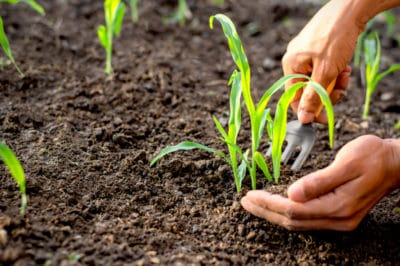Fertilize Before Planting
The first application of fertilizer for your corn crop should occur even before you plant any seeds. Corn is called a heavy feeder, which means that you need to fertilize often and well in order to provide enough nutrients for the plants to grow.
Thankfully, this is not usually an extra chore for you, since you should prepare your entire garden plot before planting anything. The best thing to do is to amend the soil with high-quality organic compost. Work the compost into the ground to a depth of about six inches (15 cm) to provide a boost of nutrients.
After working in the organic matter, apply a 10-10-10 mix of fertilizer.
This ratio supplies ten percent of three vital nutrients:
- Nitrogen. This nutrient allows the corn plants to absorb sunlight to produce chlorophyll.
- Phosphorous. It is crucial for a healthy root system.
- Potassium. It helps the corn plant move other nutrients and water into the entire plant body.
Hint
A 10-10-10 mix of fertilizer is an excellent general ratio to use on the entire garden before planting.
Fertilize When Corn Reaches Knee High
You should apply the second round of fertilizer once your corn plants have approximately ten leaves each, or when it about knee high.
At this point, the corn plants are growing rapidly and need every ounce of nutrition you can provide. Therefore, you should apply a nitrogen-only fertilizer to your corn. If you purchase an organic fertilizer, look for one with a ratio of 34-0-0.
Tip: Aged chicken manure is an excellent source of nitrogen. However, be sure to avoid using fresh droppings, as the high concentration of nitrogen can burn your corn plants.
Mulch Plants Regularly
In addition to applying the fertilizer at the correct intervals, you should also mulch your corn regularly. Mulching your corn plants with straw, hay, or other organic materials helps the soil retain moisture. It also enables the corn to access vital nutrients throughout the growing season.
As long as you provide your corn plot with good nutrition and ample water, you are almost guaranteed to have a bumper harvest.
